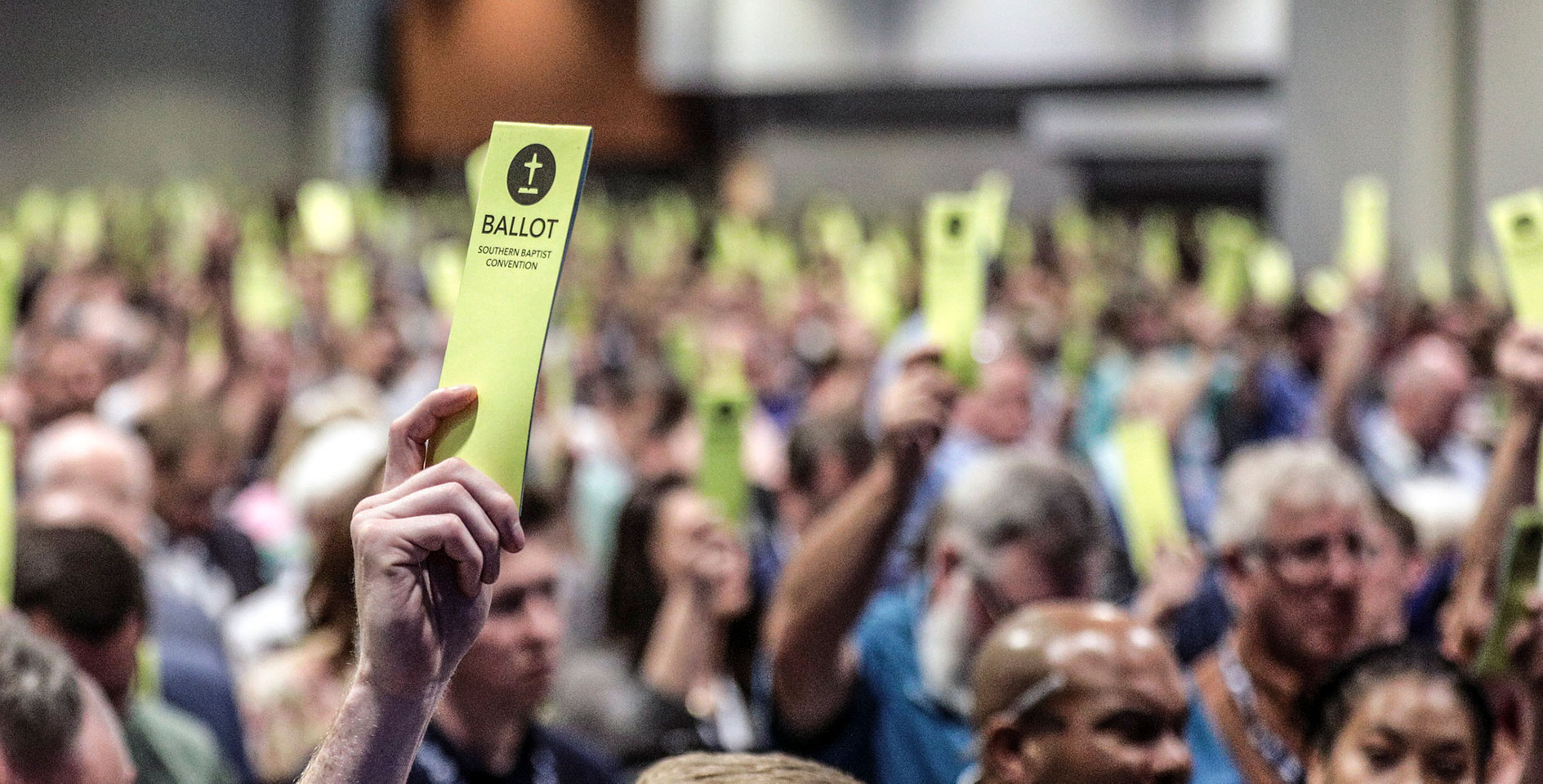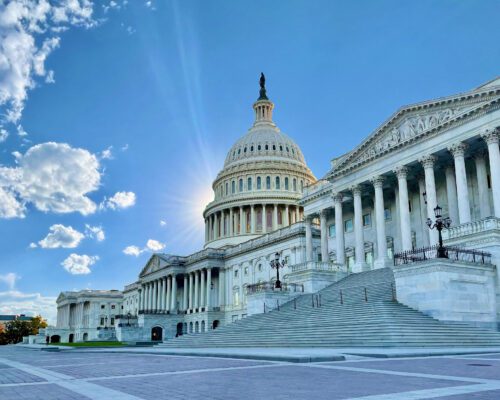There has already been a lot of ink spilled on the events of SBC21. But before we close the book on a very good annual meeting, I thought I would take the opportunity to set forth a few highlights and offer my own perspective about the state of the SBC as we move forward together.
Few of us knew what to expect heading into this year’s annual meeting. From the messenger pre-registration numbers, we could tell it was going to be a capacity crowd that shattered attendance records from recent years. The number of anticipated messengers continued to climb in the weeks before the meeting, and as they did, curiosity and concern about what would happen rose along with them.
Would the annual meeting be a fractured and contentious two-day civil war? Would the debate over CRT reach a boiling point? Who would be the next president? And how would we feel when it was all over? Those were just a few of the questions being kicked around ahead of our time together in Nashville.
Unity
But when the day finally arrived, something amazing happened: Southern Baptists came together. We didn’t just meet together physically; we came together under the banner of Christ.
At the outset, I found myself sitting next to two men, older saints whose views and preferences (even clothing) in many ways certainly did not match my own. But we stood shoulder to shoulder and prayed next to one another. We sang praises to God together. At several points, we cast votes the same way. And when we didn’t, we simply turned to one another to discuss the reasons why. Honestly, it was wonderful.
There is something special about being together in the room. For too many of us, two years without an annual meeting and the coldness of online discourse allowed a defensive posture to develop. But from my vantage point, that largely dissipated once we were in that room. I don’t mean that every person in the room was totally unconcerned about our differences. But I do mean that I think most of us felt grateful to be there together and proud of the faith and practice we hold in common.
Among the two big stories coming out of the annual meeting, our shared sense of unity is certainly one of them. Looking at the final tallies from the presidential runoff, you might think the two candidates being separated by less than 600 votes represents a deep divide. But if you were there, you know that one vote doesn’t tell the whole story, because on so many occasions, the room overwhelmingly expressed the same opinion on a range of issues. For my part, I could not be more grateful for the sweet spirit of unity that permeated so much of those two days.
Sexual abuse
The other major story coming out of the annual meeting was the resolve of the messengers to continue to address with absolute seriousness the scourge of sexual abuse among us. The abuse of the vulnerable is heinous. And it is especially so when those being preyed upon are victimized in places where they are supposed to receive spiritual care and instruction. Ahead of the annual meeting, significant allegations surfaced about the potential mishandling of the SBC’s response to the issue of sexual abuse in some of our churches by certain members of the Executive Committee.
In response to those allegations, Grant Gaines and Ronnie Parrott, local church pastors in Tennessee and North Carolina, announced their intention to call for the newly-elected SBC president to appoint a task force to oversee an independent, third-party investigation of these allegations. Gaines called for that action in the form of a motion on the first day of the meeting. But because it involved a specific SBC entity, under the convention’s rules that action was automatically referred to the Executive Committee. The following day, Gaines rose to speak to the issue and urged those to whom it pertained to treat such allegations with the utmost seriousness. But when another messenger requested a floor vote on the issue, the messengers overwhelmingly voted in favor of the motion to form the task force to oversee the investigation.
To be clear, the investigation is merely that. It is an inquiry to determine what, if any, wrongdoing occured in the course of the Executive Committee’s response to the issue of sexual abuse. But even this reflects a firm commitment on the part of the messengers, and the whole SBC by extension, to accept nothing less than our very best efforts to make our churches places that are safe for survivors and safe from abuse.
Ed Litton
The vote for SBC president was probably the most anticipated vote of the convention. And it was close. The four candidates each represented a unique vision for the future of the SBC. Each man also had a particular emphasis about what the SBC needed most at this time. Ultimately, after a memorable nomination speech from former SBC president Fred Luter, the messengers narrowly elected Ed Litton, pastor of Redemption Church in Mobile, Alabama. Providentially, Litton’s point of emphasis was unity. As a pastor, he has championed the ideas of racial reconciliation and worked with other pastors in his community to bring the body of Christ together and address points of tension and division. God willing, Litton will continue to lead efforts to pursue unity and reconciliation during his tenure as the leader of our denomination.
Sermons
One of the highlights of any annual meeting are the sermons preached from the stage in the main hall. This year, J.D. Greear delivered his final sermon as president of the SBC. And he held nothing back. In it, he addressed the issues of sexual abuse and race within the convention. He called for Southern Baptists to keep our eyes focused on our mission and to avoid allowing politics to create division.
Similarly, pastor Willy Rice of Calvary Church in Clearwater, Florida, preached the convention sermon. Rice challenged messengers to embrace not only the teachings of Jesus but the manner of Jesus as well. Specifically, Rice insisted that Southern Baptists should not be jerks in the way we treat others and warned of the divisiveness that often emanates from discussions online. Both sermons are well worth (re)watching in full.
Events & exhibits
Outside of the business of the convention are dozens and dozens of ancillary events and a massive exhibit hall. If you’re not careful, you can spend most of your time simply wandering from booth to booth picking up free swag. We had an incredible time at the ERLC booth talking to folks, giving away t-shirts, and highlighting the work of our Psalm 139 initiative that places ultrasounds in crisis pregnancy centers around the country (and soon the world). This annual meeting also featured a number of incredible events including the Send Conference, the SBC Women’s Leadership Network gathering, the seminary lunches, and the B21 panel. But an unexpected highlight for many, many people was the hymn sing that happened in conjunction with the 9Marks events that were hosted at First Baptist Nashville.
Resolutions
This year’s Resolutions Committee was an all-star team. They brought forward nine important resolutions that the messengers approved including resolutions on Baptist Unity, the Equality Act, the Hyde Amendment, and Race and the Sufficiency of Scripture. Each one was careful and precise, and to the best of my memory, all of these resolutions garnered strong support in the room. (We wrote about the ones pertaining to the ERLC here).
But at the conclusion of the time for resolutions on Tuesday, a pastor made an earnest appeal for his resolution on the abolition of abortion to be brought to the floor (it was one of several dozen the committee did not put forward to the messengers). Southern Baptists, never missing an opportunity to oppose abortion, voted convincingly to bring that resolution to be debated on the floor.
The following day, the resolution calling for the abolition of abortion was debated on the floor. I ended up speaking against the adoption of that resolution from the floor, not because I opposed its aim but because there were (and are) troubling aspects about this particular resolution. As originally written, it called for the total rejection of any law or statute to curtail abortion that fell short of total abolition. That would mean that the vital tools employed by the pro-life movement such heartbeat bills, pain-capable bills, informed-consent laws, and parital-birth abortion bans would be taken off the table.
After I spoke, another messenger successfully moved to amend the resolution to reopen the door for these measures. But even so, in my view, substantial problems remain with this resolution, which have now been addressed by seven SBC professors and separately by a member of the 2021 Resolutions Committee. Simply put, even the amended resolution provides no exception for the physical life of the mother and seems to indicate support for the prosecution of post-abortive women, both of which represent significant departures from both the SBC’s historic approach to this issue as well as the consistent messaging of the pro-life movement. The enemy in the fight for life is not vulnerable women but the abortion lobby: doctors, lawyers, and activists who profit from the destruction of innocent human life. Though women who pursue abortions unquestionably commit a grievous sin, it is still critical to distinguish between these vulnerable women and the abortion industry that preys upon them.
Ultimately, I absolutely affirm the messengers’ desire to make a clear statement demonstrating their resolve to end abortion at the nearest possible opporunity. And honestly, I believe that is what most believed they were voting for: a resolution calling for the immediate abolition of abortion. Unfortunately, this resolution went further than that in ways that actually repudiate the efforts of the pro-life movement in which countless Southern Baptists labor every day. In any case, it presents an opportunity to potentially revisit this opinion next year at the annual meeting in Anaheim, California.
Conclusion
To wrap this up, I would simply say that for myself and so many others, this year’s annual meeting was a surprising and welcomed breath of fresh air. Regardless of which candidate we may have supported to succeed Greear, last week so many Southern Baptists were able to come together and remember how wonderful it is to partner with millions of other Baptist Christians through the SBC for the purpose of reaching and discipling the nations. From my vantage point, we were unified and filled with joy, and we left with confidence that the SBC has exciting days ahead of us.










